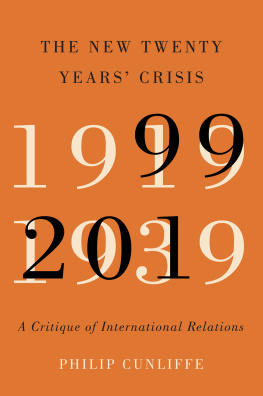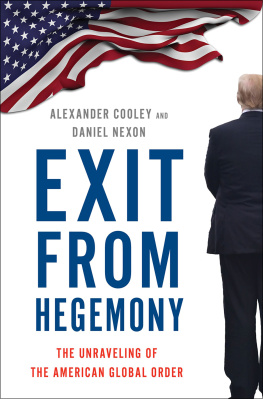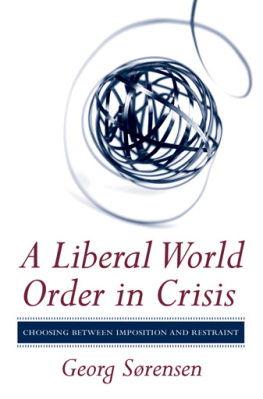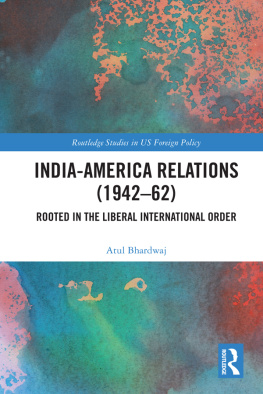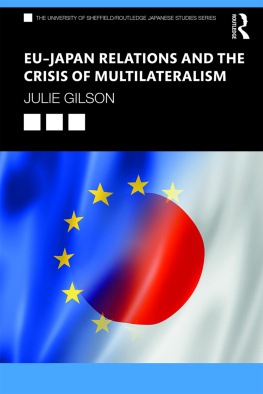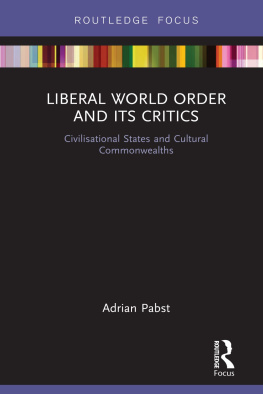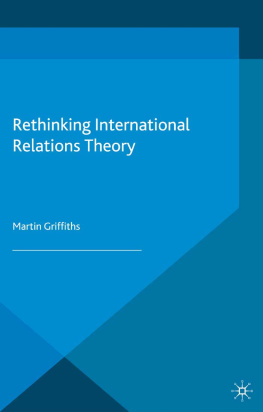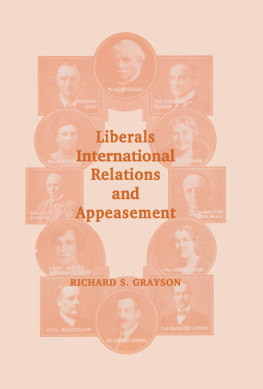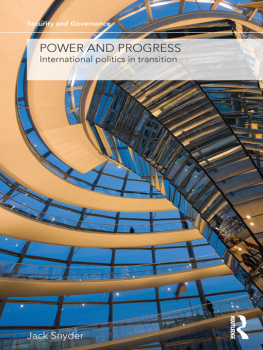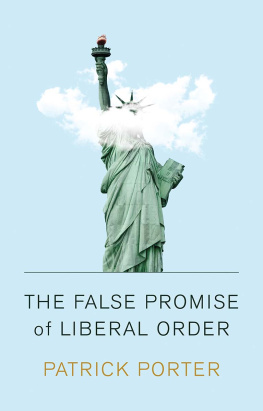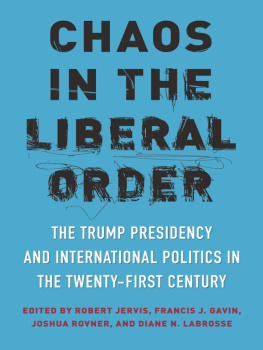
The New Twenty Years Crisis
The New Twenty Years Crisis
A Critique of International Relations,
19992019
PHILIP CUNLIFFE
McGill-Queens University Press
Montreal & Kingston London Chicago
McGill-Queens University Press 2020
ISBN 978-0-2280-0101-0 (cloth)
ISBN 978-0-2280-0102-7 (paper)
ISBN 978-0-2280-0240-6 (ePDF)
ISBN 978-0-2280-0241-3 (ePUB)
Legal deposit third quarter 2020
Bibliothque nationale du Qubec
Printed in Canada on acid-free paper that is 100% ancient forest free (100% post-consumer recycled), processed chlorine free
We acknowledge the support of the Canada Council for the Arts.
Nous remercions le Conseil des arts du Canada de son soutien.
Library and Archives Canada Cataloguing in Publication
Title: The new twenty years crisis : a critique of international relations, 19992019 / Philip Cunliffe.
Names: Cunliffe, Philip, author.
Description: Includes bibliographical references and index.
Identifiers: Canadiana (print) 20200213407 | Canadiana (ebook) 20200213415 | ISBN 9780228001010 (cloth) | ISBN 9780228001027 (paper) | ISBN 9780228002406 (ePDF) | ISBN 9780228002413 (ePUB)
Subjects: LCSH: Carr, Edward Hallett, 18921982. Twenty years crisis, 19191939. | LCSH: International relationsPhilosophy. | LCSH: World politics21st century. | LCSH: Liberalism. | LCSH: Utopia.
Classification: LCC JZ1305 .C86 2020 | DDC 327.101dc23
Set in 9.5/13.5 Baskerville 10 Pro with Berthold Bodoni
Book design & typesetting by Garet Markvoort, zijn digital
For Mio
Contents
Preface and Acknowledgments
This book argues that we have been through a twenty years crisis in which we have seen the degradation of liberal international order. We have now come through to the other side of that crisis, yet without being able to recognise our new political surroundings or identify the shape of a nascent new order. Instead, we remain ensnared in outmoded ideas, still unable to think politically as a result of inherited liberal dogma. This book seeks to reboot our thinking about international politics by critiquing prevailing ideas in International Relations (IR), the academic study of international politics.
I realised just how much my discipline of IR was in trouble, a few years back, while dawdling in an airport lounge en route from a major academic convention. I was chatting to a friend and colleague, also an IR academic, whose intellectual interests had, I felt, drifted in odd directions in recent years. It now dawned on me just how bad things had got when he told me that he was considering establishing a new journal, to be called Critical Plant Studies. He was entirely confident that an array of academic publishers would support it, as there would definitely be a lucrative commercial demand for such a journal across the global university sector.
My colleague was only half-joking (I think). Joking or not, the most disturbing thing about this encounter was that I could myself easily see the intellectual rationale for such an endeavour. The table of contents, papers, conference proceedings and future intellectual twists and turns of this new discipline unfolded in my minds eye deep into the future. For a start, root systems clearly represented a transgression against sovereign borders, as well as providing fresh, vegetal perspectives on transnational movement in an age of globalization. There were a few dozen workshops, special journal issues, and edited collections right there. These could be followed up with meta-analysis and critiques drawing on indigenous knowledges to contest patriarchal settler accounts of orthodox plant studies. Follow that up with the relational, non-essentialist ontologies that would be enabled by the (literal) hybridity of plant-based ways of life, and a whole new range of post-human insights could be used to disrupt the deeply-rooted preconceptions that underlie our anthropocentric distinctiveness and speciesist sexuality. I could even perceive the outline of a hitherto undreamt of intellectual challenge one that went beyond anything as parochial as speciesism or as trivial as anthropocentrism (let alone Eurocentrism). For critical plant studies could subvert the exclusionary hegemony of the entire animal kingdom itself.
Disturbed by these visions of rhizomatic revolt on my plane journey home, upon my return I rushed to Google and was immensely relieved to see that critical plant studies had in fact already put down roots as a new academic speciality over the last couple of years. Surely this meant that intellectual life in the academy could not rot any further. Yet my relief quickly gave way to doubt once again, as I noted that critical plant studies was planted, so to speak, at the intersection of philosophy, literature, and cultural studies. This inter-positional terrain would provide fertile soil for exactly the kind of trans-disciplinarity beloved by the bureaucrats of university management and funders, providing as it did potential overlap with fields such as ecology, biology, agriculture, horticulture, all of which would all be able to bring their own perspectives to plant studies. While I had resigned myself to the fact that the humanities and social sciences had long ago become a postmodern swamp, I was filled with foreboding by the thought that not even the natural sciences were safe from the challenges posed by plant life.
The conversation with my colleague brought forth some buds that had been growing for a while, in particular my unease with a discipline that had been showing distinct signs of hypertrophy for some time. I had noted that for some years now, browsing through programmes of our disciplinary conventions, that one would be lucky to come across an academic paper that mentioned a country or international organisation in its title. There were so many debates about epistemology and ontology that one could be forgiven for thinking they had stumbled into a philosophy conference. Tightly hugging the stony ground of mid-range theory, behaviourist and neo-positivist approaches carefully insulated themselves from larger claims about the changing character of international order or competition for power.
Given how deeply rooted these problems were, I realised that a radical critique was required, and, as Karl Marx points out, to be radical means to grasp things by the root. In a post-patriarchal age, what could be more radical than to return to one of the founding fathers of the IR discipline, Edward Hallett Carr? By an uncanny coincidence, on the eve of the eightieth anniversary of the publication of Carrs classic text The Twenty Years Crisis, 19191939, world politics was thick with fears of economic depression, rampant nationalism, renewed geopolitical rivalries, resurgent xenophobia, populist demagogy and portents of cataclysmic international collapse echoes of the interbellum of 1919 to 1939. What makes Carrs text so useful and apposite however is less the similarities between our time and his as the fact that he shows how the internal contradictions of interwar liberalism rent it apart. In other words, Carrs insights should spur us not to misapportion blame for our woes on external foes. Carr also went further than this, charging inter-war liberalism with being utopian, as the liberals of his era frantically sought to maintain and propagate the outmoded ideals and institutions of earlier eras deep into the twentieth century. In this book, I argue that new and vigorous strains of liberal utopianism have emerged that are no less deeply rooted in existing power structures, that, confusingly, take anti-liberal forms but that are no less effective in obscuring the realities of international politics. I want to show that Carrs critique can be usefully applied to help us see how so many of our ideas, theories, and concepts about international politics serve existing interests while expressing the outlook of an era that is receding into history unipolar globalization.
Next page
